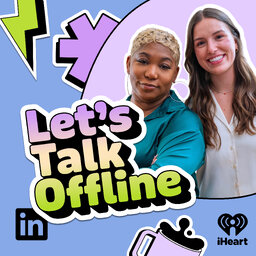New Year, New Career
Let's Talk Offline
Each week on Let's Talk Offline, LinkedIn's Gianna Prudente and Jamé Jackson Gadsden answer your unfiltered questions about work life, from negotiatin…We’re still spotlighting our favorite episodes from the LinkedIn Podcast Network. The start of a new year is an opportunity for change, so this week we’re sharing an inspiring conversation about career pivots from Hello Monday. LinkedIn’s Jessi Hempel chats with Peloton’s Robin Arzon about her journey from being a corporate lawyer to becoming a fitness expert. Robin’s story shows us that careers are not linear and taking that leap of faith is worth it.
Do you have any burning questions about work? We want to hear them! You can email us your questions at letstalkoffline@linkedin.com.
Check out more episodes of Hello Monday: https://podcasts.apple.com/us/podcast/hello-monday-with-jessi-hempel/id1453893304
For more, follow Gianna (http://linkedin.com/in/giannaprudente) and Jamé (http://linkedin.com/in/jamejackson) on LinkedIn and subscribe to Gianna’s weekly newsletter: https://linkedin.com/letstalkoffline.
Credits
Gianna Prudente - Co-host, Early Career Development Editor, LinkedIn
Jamé Jackson - Co-host, Community Manager, LinkedIn
Sabrina Fang - Producer, Western Sound
Maya Pope-Chappell - Director of Content & Audience Development, LinkedIn
Jessi Hempel - Chief Content Officer, LinkedIn
Savannah Wright - Senior Producer, Western Sound
Sarah Dealy - Associate Producer, Western Sound
Alex MacInnis - Engineer, Western Sound
Courtney Coupe - Head of Original Programming, LinkedIn
Dan Roth - Editor in Chief, LinkedIn
Ben Adair - Executive Producer, Western Sound
Katrina Norvell - Executive Producer, iHeartMedia
Nikke Ettore - Executive Producer, iHeartMedia
In 1 playlist(s)
Let's Talk Offline
Each week on Let's Talk Offline, LinkedIn's Gianna Prudente and Jamé Jackson Gadsden answer your unf…Social links
Follow podcast
Recent clips

Tackling Imposter Syndrome
36:37

Is Grad School for Me? with UBC Educator Rob Kim
41:04

AI Doesn’t Have to be Scary
19:18
 Let's Talk Offline
Let's Talk Offline